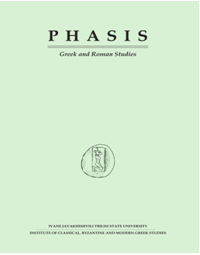Die Amazonen am Kaukasus: Eine mythographische Spurensuche
The Amazons in the Caucasus: A Mythographical Quest
DOI:
https://doi.org/10.60131/phasis.27.2024.9058Abstract
The Amazons are among the most captivating figures in Greek mythology, as the idea of warrior women equal to men both fascinated and intimidated the ancient Greeks. Accordingly, the stories of encounters between Panhellenic heroes and Amazons are as numerous as the reports regarding the geographical location of the Amazons, ranging from Libya to Thrace, Scythia, and Asia Minor. Some Greek sources also mention Amazons in the Caucasus, and although the idea of Caucasian Amazons is relatively weakly attested, the existing evidence is nonetheless highly revealing. This is particularly true of Strabo’s account (11.5.1-4), who, drawing on earlier historians, describes how the Amazons originally migrated to the northern Caucasus together with the Gargarians, later separating from them but still meeting annually for the purpose of reproduction. Strabo links his ethnographic remarks to a fundamental reflection on the relationship between myth and history, engaging in a close dialogue with Thucydides and the latter’s claims regarding truth and credibility, as outlined in his famous methodology chapter. This article demonstrates how Strabo’s account is connected to the Greek idea of the Caucasus region as a peripheral region between the ‘civilized’ Greek world and the ‘barbaric’ world outside. From a Greek perspective, both the Caucasus and the Amazons epitomize the periphery, implying both partial belonging and partial non-belonging. Consequently, Strabo’s report on the Caucasian Amazons serves as a means to engage in some fundamental reflections on the relationship between history and myth and thus, ultimately, between truth and fiction.
Downloads
Published
Issue
Section
License
Copyright (c) 2024 PHASIS

This work is licensed under a Creative Commons Attribution-NonCommercial 4.0 International License.


